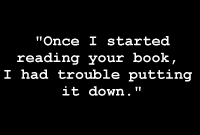

 |
 |
|
|
Blogs – March 2004Yes, I know the purpose of a blog is to update it regularly. :) But I've been busy with a few projects lately, including my son's Little League. I love watching these four to six-year-olds learn how to play baseball, which really is a complex sport. It involves hand/eye coordination, strategy, and development of proper form and technique. Most importantly, it requires patience. Baseball makes you wait in the field or on the bench – sometimes for long periods of time – until something happens that requires you to perform swiftly and expertly. That's a lot to expect four to six-year-olds to do. How do you get kids to master such a challenging sport? You let them make mistakes. In my son's T-ball league, we don't keep score, and we don't count outs. It doesn't matter how many times the kids hit the tee instead of the ball. If the shortstop throws the ball ten feet to the right of the first baseman, that's OK. We cheer when a player catches a throw or hits the ball past the outfielders. We want to recognize and reinforce good play, but we don't berate players if they don't succeed. When managers and coaches insist on perfection, it inhibits performance instead of encouraging it. Learners become paralyzed and unmotivated. They shy away from necessary risk, avoid searching for more effective solutions in fear of rejection, or become so nervous about making mistakes that they create even greater errors. By making mistakes, people become free to experiment and find what techniques work best for them. Innovation can take place. People can focus on how to improve their skills instead of being afraid of being beaten down for errors. And when clutch situations come up that demand high performance, people can face them with confidence and without the choking pressure of perfection. This lesson applies equally to work teams as well as ball teams. Give people a safe, supportive environment to grow so when they reach the majors, they can perform like champions. I was the contest Toastmaster for our area speech contest this morning. This contest provided a couple valuable lessons. The first is how Toastmasters can help people overcome shyness. When the table topics Toastmaster asked the contestants why they joined Toastmasters, half of them said it was to overcome shyness. One of the people who admitted his shyness, Nicholas Bartlett-Price, would become the contest winner! He said that Toastmasters helped him come out of his shell and become more confident in front of people. And confident he was, giving a humorous, enthusiastic, and richly detailed speech about the 1066 Norman invasion of England. The second is that helping people succeed is more rewarding than succeeding yourself. A member of our club, Jennifer Hahn, won the area's International speech contest. (This was the contest I won last year for the speech "Bound". More info) I've watched her grow and develop as a speaker in the time she's been with our club, and I've seen her refine and improve her contest speech each time she gave it. Her victory was a victory for all of us in our club. Both of these lessons show that the greatest gift we can give is to help others. Even the smallest bit of help – such as an encouraging smile or some advice on how to use a prop – can make a big difference to someone else. And when others grow as a result of our help, it is a reward for us as well. So, find someone you can help today. Related TopicsPrevious Blogs |
| |
|
|
|||